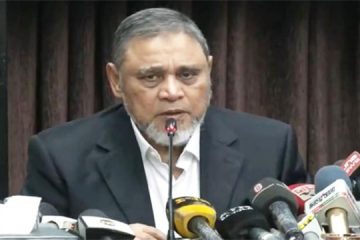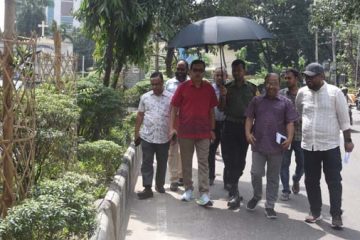Finance minister AMA Muhith in his budget speech on Thursday announced that the present government will not take any decision on the coal policy, although it has chalked out plans to produce around 7,000 MW of electricity from coal-based power plants. “We have prepared a report on the coal policy. However, we would like to leave this report for the next government so that it can take a decision on it,” the finance minister said.
Considering the demand for power and energy and the importance of these sectors, the government has allocated Tk. 11,351.20 crore for FY 2013-14 — development and non-development budgets combined — for the ministry of power, energy and mineral resources. This amount was Tk. 9,544 crore in the 2012-13 fiscal year.
The finance minister told Parliament that the power sector would get Tk. 5,170 crore and the energy sector will get Tk. 5,500 crore, respectively.
“We had undertaken a three-year special programme to mitigate the deficit in the power and energy sectors and to bring about overall development of these sectors, we provided Tk. 15,230 crore as subsidy for procuring liquid fuel from abroad. This year the amount of subsidy would stand at Tk. 24,759 crore,” he added.
In his speech, the finance minister did not make any mention about cost-cutting measures in generating power from imported items such as fuel or coal.
He said, “If we can extract coal from our own mines and ensure smooth supply, our dependence on imports will gradually diminish. Considering all these aspects, we have prepared a report on the coal policy. We have completed the preparatory work for formulating the coal policy.”
“The major question is whether we will use the open pit method of coal extraction for Barapukuria and Phulbari coal mines. It is also a challenge to ensure rehabilitation of many families in a densely populated area as the most critical issue of this project is the impact of open pit mining on the environment as well as on underground aquifers and water layers,” he told JS.
Muhith told Parliament that the government has achieved major milestones of success in the energy and power sectors. “As many as 54 power plants have been set up”. “We have so far supplied 3,845 MW of additional electricity to the national grid and the number of beneficiaries of coverage of electricity has been raised from 47 to 60 per cent. Meanwhile, we have installed 2 million solar home systems. New electricity connections have been provided to 3m consumers. We have also taken necessary steps for installing a coal-based 1,320 MW power plant. We have signed an agreement with Russia to install two nuclear power plants of 1,000 MW capacity each, at Ruppur in Pabna. By 2015, the total power generation capacity will reach 14,500 MW,” he added.
The finance minister said, “Recently, we have withdrawn the ban on gas connections for domestic consumers. We have created a fund named ‘Gas Development Fund’ for investment in and development of oil and gas exploration, production and distribution activities. In order to enhance energy security, the storage capacity of Bangladesh Petroleum Corporation has been enhanced to 9.83 lakh MT.” Professor Ijaz Hossain of BUET said the government should have taken measures to install efficient and dual-fuel machines to produce power.
“Since we are dependent on imported primary fuel, we need to implement that first if we want to cut costs,” he added.
-With The Independent input




















